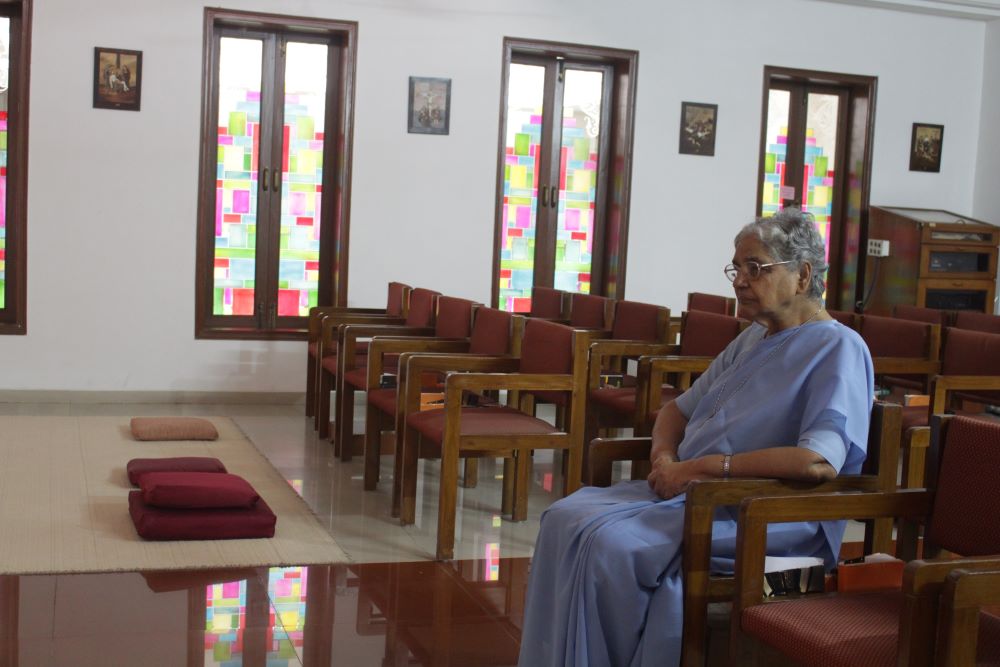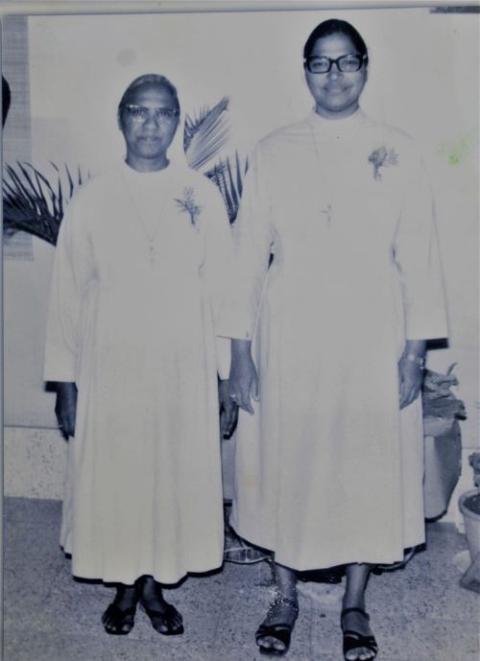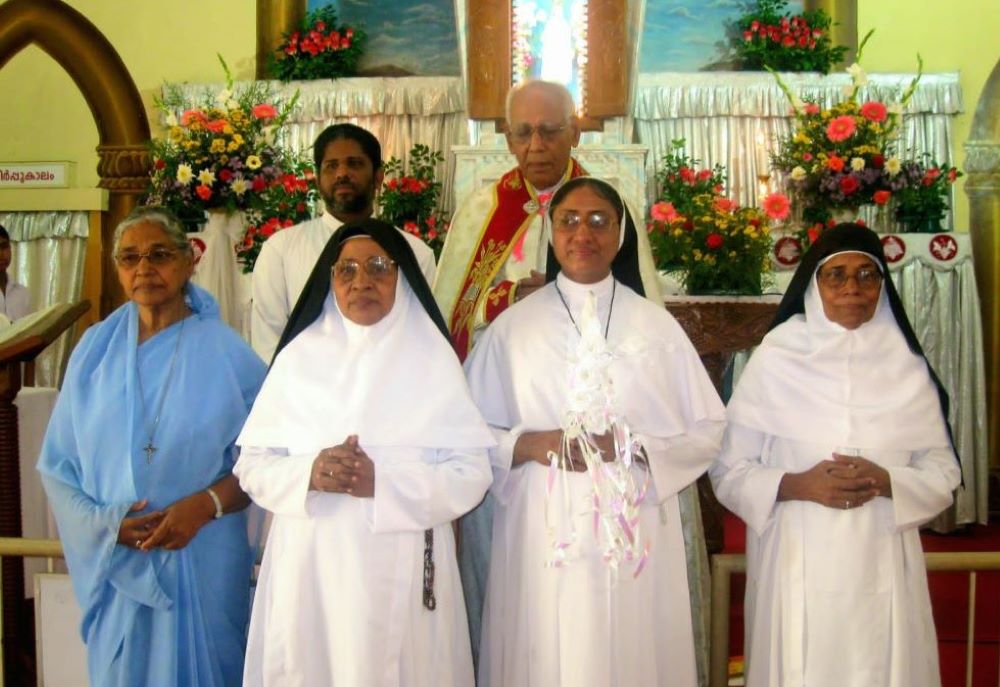
Sr. Marion Chemmanoor, 90, spends her time in prayer, now the core mission of her life. A teacher by profession, she played a crucial role in the growth of her congregation in India and was instrumental in establishing mission houses throughout the country. (Courtesy of Tessy Jacob)
Sr. Marion Chemmanoor is a pioneer sister among my congregation, Missionary Sisters Servants of the Holy Spirit in India. In 1953, she and another aspirant were the first Indian women to join the congregation; sisters from my congregation first arrived in India from Europe in 1933.
Chemmanoor, who celebrated her 90th birthday Sept. 10, shared her life experiences with Global Sisters Report. Having lived through pre- and post-independence India, and pre- and post-Vatican II, and pre- and post-digitalization, Sister Marion holds a treasury of memories about life transitions.
She played a crucial role in the growth of our congregation in India and was instrumental in establishing mission houses throughout the country.
A teacher by profession, she continues to teach informally. Retirement is not her cup of tea. She is often engaged in reading and keeping herself updated. She migrated to the digital age seamlessly, and her vigor and energy inspire others to learn. Young at heart and quick to adapt to changes, she continues her mission online and offline.
Global Sisters Report: Behind every vocation, there is an interesting story. Can you tell us about your journey as a young girl to be a missionary?
Chemmanoor: I was born to my devout Catholic parents as the seventh and youngest child on Sept. 10, 1934. It was pre-independence, and the British ruled India. I belonged to the then Madras Province, which later became Kerala state. I belonged to an agriculturalist family, and my parents took care to educate all seven of us. They also took extra care to impart Catholic values. We regularly attended morning prayer, noon prayer if we were at home, evening prayer and night prayer with [the] rosary after our studies, after which we had dinner.

Sr. Marion Chemmanoor and the late Sr. Emilian Sebastian were the first aspirants from India to join the Missionary Sisters Servants of the Holy Spirit in India. (Courtesy of Marion Chemmanoor)
I was active in parish activities, especially youth groups. For higher secondary studies, I was sent to a school managed by the Franciscan Clarist Congregation, an Indigenous congregation of Kerala. After that, I was admitted for intermediate studies to a college managed by the Carmelites of Mary Congregation. Due to tedious daily commuting, I lived in a hostel managed by another congregation near the vicinity of the college.
Associating with the religious way of life heightened my dream to be a nun. This drive became more intense when one of my sisters and elder brother chose the consecrated way of life in Kerala. However, I nurtured the dream to be a missionary.
The sociopolitical scenario of India was different at that time, with the freedom struggle and gradual establishment as a sovereign independent country. Yet, being able to pursue studies was the greatest of opportunities.
Did you choose the congregation you wanted to join?
My decision was not easily accepted. However, I was persuaded and finally, in April 1954, found myself traveling to Indore, Central India, on a three-day journey by train to join the Missionary Sisters Servants of the Holy Spirit. Two more Indians would soon join me.
It was a sudden turning point in my life. The sisters were Europeans and Americans. We had to follow their lifestyle, including food habits and dress. They were extremely caring and accommodating. Soon, we were involved in every activity of the convent life. The formation of religious life was action oriented. Learning by doing was the criteria, and that involved much manual labor.
Novitiate days were rigorous. Work, prayer and study were given maximum importance, following strict schedules. At night, after 9 p.m., was the time of great silence until the next morning's prayer. There were no digital distractions of any sort. The maximum energy was utilized for constructive activities.
It was the pre-Vatican II days, and Latin Mass was still prevalent in India. Besides a few European languages, we learned Latin, too. Although maneuvering these phases was hard at times, this definitely formed me to take the rest of my life more professionally.

Several members of the Chemmanoor family joined religious communities in the Catholic Church in India. Sr. Marion Chemmanoor, left, is pictured with siblings and nieces. (Courtesy of Marion Chemmanoor)
Your adventurous spirit offered us a glimpse of the secret of your youthful energy. We would like to hear about your life as a young sister.
On Jan. 6, 1958, we made our first profession. During my juniorate years, I was sent to complete my undergraduate and postgraduate studies. I graduated in physical chemistry. Studies were considered a part of life, not a pivotal part of life. The religious way of life was never compromised for academics. We followed the convent schedule stringently and gave our best in secular studies. That was remarkable: In those days, the primary aim of our lives stood undiluted.
In 1964, I professed my final vows, and two of us were sent to Rome for theological studies. Although the duration was three years, we were called back to India after one year due to the compelling need of the mission here. To ease our feelings, the superiors graciously allowed us to visit a few places in Europe. Sometimes, care matters more than privileges. Although we were of different nationalities, the senior sisters were very mindful of us and prioritized our development. That generosity was typical of their leadership.
The congregation was preparing you for greater roles in the future years. With every passing year, many more joined, and the congregation expanded throughout India. How were you able to contribute to that process?
Yes, even with the limited number of sisters, the congregation has branched out to different parts of India, especially South India. Our senior sisters pioneered other collaborative efforts of the church in India. I was privileged to grow up with such efficient women. They were very diligent and practical. They nurtured strong willpower and commitment. And they also formed us in that fashion.
In 1968, I was appointed principal of St. Raphael's School in Indore. It is a highly reputed school in the city. Although I was involved in teaching at different phases, taking up the administrative position was a great call. I am indebted to my superiors for their trust and confidence in me.
This was a hard time. Stabilizing the Indian mission with more establishments and opening new houses meant discernment and wise decision-making. With limited resources and underdeveloped technological aids, we had to work manually. The journeys were long and tiresome. Communication facilities were primitive. But I never felt tired or disappointed.
Advertisement
Indeed, the initial stages are challenging. The younger generation is thriving on the mission you all began. Almost all the European sisters who worked in India have returned to their creator. How would you sum up your 55 years of life as religious?
Besides the work of administration, I was always a teacher. I love that profession and am always willing to teach any group of students.
When I look back, I can only see that I was trusted so much by God and my authorities. God has blessed me in every way. It does not mean I had no difficulties. I took the humiliations and misunderstandings I had to go through with courage and determination and offered them up in prayer. I understood the value of discipline in life, a must for religious.
For me, confidentiality and faithfulness, love and unity, simplicity of life, and teamwork are very important. I enjoyed community life and recreation, which gave me relaxation and energy. I experienced trust and confidence from many, and I could go on in peace and tranquility.
I strongly believe that if we live a life of prayer, discipline and hard work with the right amount of leisure and entertainment, we can live a contented life. I have all the reasons to thank my superiors and formators who have placed their conditional trust and confidence in me and further entrusted me with the growth and expansion of the Indian mission of the congregation.





